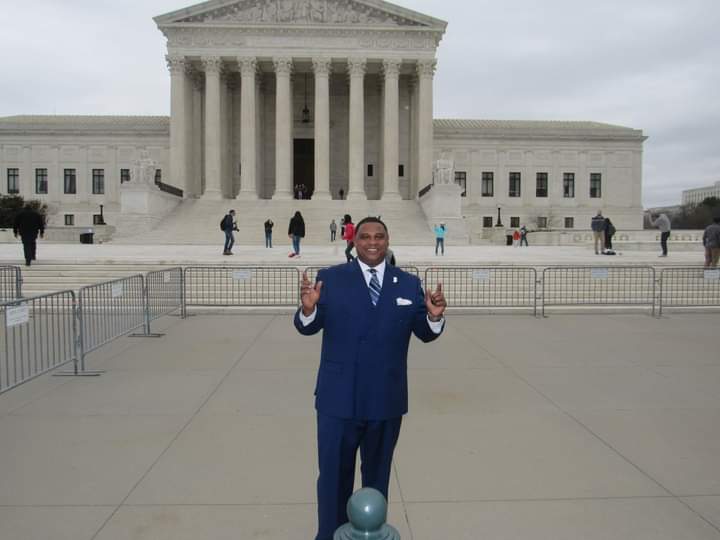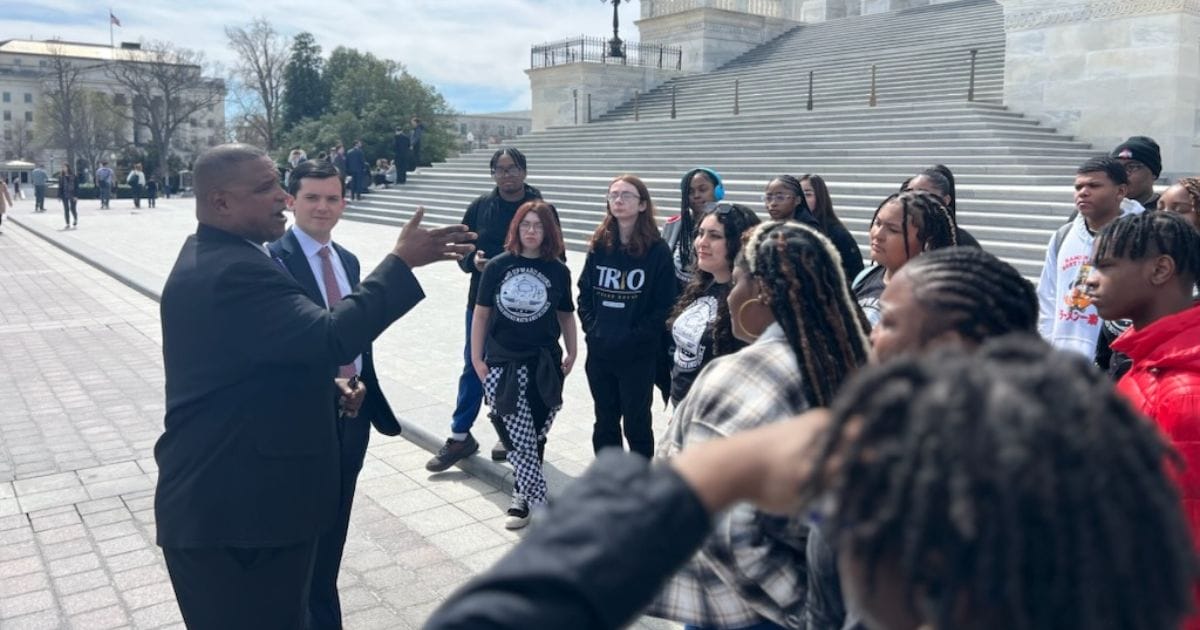Photo caption: MACEO RAINEY SPEAKING to a group of TRIO students in Washington DC.
Much has been written and said about the recent United States Supreme Court decision regarding Affirmative Action as it relates to college admissions throughout the United States. The core of the Supreme Court’s remedy is based on the notion that colleges and universities must significantly limit the use of race in the admissions process. Therefore, considering one’s race and/or ethnicity as a category or grouping percentage is no longer permitted, thus forcing the nation’s colleges and universities to establish more creative ways to fashion a diverse student body on campus.
In essence, the U.S. Supreme Court maintains that race-conscience admissions policies and plans directly violate the United States Constitution and the rules and regulations governing colleges and universities that receive federal funding. The concern that we must face now is how the Supreme Court’s decision regarding Affirmative Action will impact and apply to the awarding of minority scholarships, grant opportunities, student recruitment, and outreach initiatives. All of these support the notion that educational access and opportunity for all is a fundamental principle for preserving our democratic way of life.
Access to college and the opportunity to a pathway to the “American Dream” has not always been accessible for all, especially for people of color. Think back to the African-Americans who were brought to the banks of the Jamestown River in Virginia in 1619 as slaves and property of wealthy land-owning southern aristocrats. Were they given access and opportunity to the educational institutions of their time? Absolutely not.
For nearly 250 years, these enslaved Africans provided the skilled labor and agricultural maintenance that transformed the United States into the most financially prosperous nation on earth. However, they were never compensated nor rewarded for their labor. They were not allowed to enjoy advancement and prosperity, nor education and literacy. Even after the end of slavery in the U.S. access to educational opportunities remained limited and/or non-existent for African Americans and people of color, but not for lack of effort on the part of people of color.
Our nation’s history can attest to my assertion of this in the cases of Brown versus the Board of Education, the Little Rock Nine incident, Governor George Wallace’s action at the University of Alabama, and the bravery of James Meredith at the University of Mississippi in 1966. All of these support the notion that educational access and opportunity for all is a fundamental principle for preserving our democratic way of life.
Henceforth, by way of Affirmative Action policies and federally funded programs, the nation’s colleges and universities have provided educational access and opportunities for underrepresented students from sea to shining sea.
Some of the underrepresented students who benefitted from Affirmative Action and federal programs for college access and inclusion include but are not limited to: Oprah Winfrey, talk show host, author, and philanthropist; A.C. Green, NBA player; Ketanji Brown Jackson, U.S. Supreme Court Justice; John Quinones, television correspondent; Viola Davis, actress; Patrick Ewing, Hall of Fame NBA player; Franklin Change-Diaz, astronaut; and Clarence Thomas, U.S. Supreme Court Justice.

These and countless others have all benefitted educationally and socially from Affirmative Action and federal programs that support educational access and opportunities. One of the federal programs that has supported many of the aforementioned individuals, is TRIO, a federal program that provides college access and opportunities to the nation’s income-eligible and potential first-generation college students.
In the State of Indiana, we have 35 TRIO Programs across the state that serve over 8,800 students with $12 million in federal funding annually.
Northwest Indiana has also benefitted from Affirmative Action and federal programs by providing educational access and opportunity programs for thousands of talented students from underrepresented communities. Some of these exceptional students of color include: Dr. Michael McGee- a medical doctor and graduate of the TRIO-McNair Scholars Program and founder of a youth health awareness and violence prevention outreach program called Project Outreach & Prevent on Teen Violence (POP); Ellis Dumas III, a graduate of the TRIO Program and vice president of Programs & Outcomes at the Boys & Girls Clubs of Greater Northwest Indiana; and Jonathon Wilson, a proud graduate of the TRIO-McNair Program at Purdue University Northwest, who was the first PNW student to win the coveted and prestigious Fulbright Scholarship and has presented his research at conferences on a national level.
Equally as important, the TRIO- Educational Talent Search Program on the campus of PNW-Westville has produced several winners of the Lilly Foundation Community Scholarship for the past two years consecutively, providing higher education institutions in Indiana with access to a plethora of college-ready students from diverse backgrounds as well as students who are the first in their families to attend college.
In final analysis, it is my deep belief that many Americans are unsure at this point how the high court’s decision on Affirmative Action will directly impact the higher education landscape: especially, for students of color via admissions, scholarships, recruitment, and outreach.
However, what I do know unequivocally is that without Affirmative Action and federal programs that directly benefited my extended family, there would be no cousin Dr. Lawrence Zollicoffer-Rainey, the 4th African-American graduate of the University of North Carolina School of Medicine and founder of Garywn Medical Center in Baltimore, Maryland.
Nor would there be Grandma Emma Jenkins Rainey, a graduate of Shaw University and lifelong educator and librarian. Nor would there be cousin Carlton Rainey who earned a degree in Mechanical Engineering, from North Carolina A&T State University.
Nor would there be Uncle Aldo Ray Rainey who earned his master’s degree from the University of Wisconsin-Madison. Nor would there be cousin Dr. James Rainey who earned his doctorate degree.
And nor would there be me, Maceo Rainey, who has earned multiple college degrees and is the current director of TRIO-Educational Talent Search at Purdue University Northwest-Westville Campus, currently serving as Indiana TRIO President.
All of this, would make my great-great-great grandfather who was an enslaved African by the name of “Ole Zolli” extremely proud of the educational access and opportunity provided to his decedents, since he and other enslaved Africans were never compensated for their labor which built the economic infrastructure of the United States.






